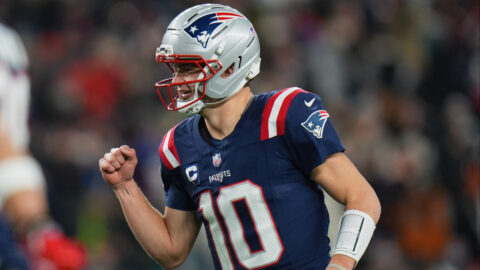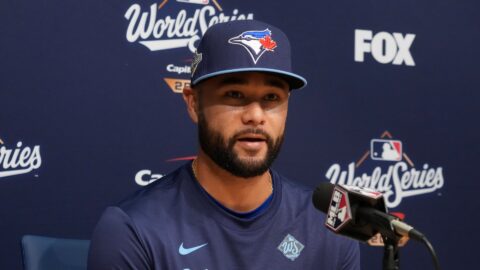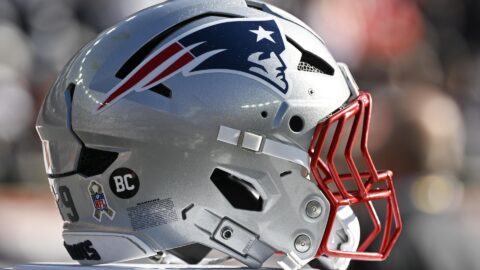Blake Wheeler left his arbitration hearing last month relieved that the arguments didn't get as nasty as he feared, noting that "it was all done in a very professional manner."
But while the Bruins didn't take him to the woodshed over his shortcomings, Wheeler did appear to take their critiques to heart. Now it's up to him to approach his third season in the NHL in a professional manner and show he's capable of addressing those concerns.
"I'm very happy with just getting the whole process over with and having a deal in place so my focus can now be on just getting myself in the best shape possible for this upcoming season," said Wheeler after the Bruins officially accepted his $2.2 million arbitration award.
Wheeler's conditioning hasn't been the issue. His willingness to use his 6-foot-5, 205-pound frame effectively has been more of a cause for consternation.
"I think for me, it's all about just being more physical and being more of a presence, especially on the forecheck," said Wheeler. "I think I've been so focused on the offensive production and the numbers side of things, but I think there's more ways to be a contributing factor on the ice. It's all about understanding your areas of strength and your areas of weakness. I think if I can just assert myself more physically, then it's going to create a lot more opportunities for myself and for the guys I'm playing with."
Wheeler has never established the kind of physical presence the Bruins envisioned when they won the bidding war for his services as a free agent out of the University of Minnesota in 2008. He managed just 49 hits in 81 games as a rookie in 2008-09. He improved a bit last year, but still had less than one per game with 70 hits. That was good for just 13th on the club despite the fact that Wheeler was one of just two Bruins to play in all 82 games.
In the playoffs, he added just 11 hits in 13 games, which ranked him 15th on the team. Of the players below him, only Miroslav Satan (four hits in 13 games) played in 10 games or more.
The hit stat is far from definitive, as what constitutes a hit can vary widely from arena to arena, but it does give a solid indication of which players are willing to initiate contact to force turnovers, pressure defenders and win battles along the boards.
And that is what the Bruins need from Wheeler. They aren't trying to turn him into a bruiser looking to steamroll everyone in sight or drop the gloves on a regular basis, though he probably didn't help his cause by raising such expectations when he cited Cam Neely as a role model when he first signed in Boston in 2008.
"One of the big things about the Bruins organization was having somebody like Mr. Cam Neely in the front office," said Wheeler in his first news conference with Boston media that July. "The way he played the game is something that I would like to model the way I need to play my game."
Wheeler isn't going to develop Neely's mean streak, but he can at least get a little closer to the kind of offensive production the Bruins legend used to deliver. Wheeler has been solid in his first two seasons, scoring 21 and 18 goals, but he has the potential to do much more than that.
To reach that potential, Wheeler will have to be more consistent and find a way to put more shots on net.
His streakiness has been evident since he made the leap to the pro ranks, and his cold stretches have been particularly pronounced. In 2008-09, he went nine games without a goal after netting a hat trick against Toronto on Nov. 6, and he also had two 11-game droughts and finished the season with no goals in his final 12 games, including no points in eight playoff games before being benched against Carolina.
Last year, he exploded for four goals and seven points in three games in early January and had goals in three straight games in mid-March, but other than those brief hot streaks, his offense disappeared for long stretches. He went 15 games without a goal from Nov. 28 to Jan.4, then had one goal in 16 games surrounding the Olympic break, one goal in the final 14 games of the regular season and just one more in 13 playoff games.
Some of Wheeler's scoring woes can be traced to his lack of shots. He had just 159 shots last year, an average of fewer than two a game. Part of that stems from his tendency to look for the pass first, a carryover from his college days when he played primarily at center. But even when he does shoot, Wheeler was often off target, as his 63 missed shots were the fourth-highest total on the team. He's been looking to correct both issues this offseason.
"I've been working on my shot quite a bit this summer, trying to do whatever it takes to extend my range a bit," said Wheeler, who has been firing pucks at a tarp set up in his garage this summer.
"It's about getting comfortable with shooting farther away from the net," added Wheeler. "Any time you put a shot on net anywhere from the top of the circles in, it's going to be a pretty good look. I think just getting that mentality and getting comfortable with letting the puck go like that is something that can really help me. I think I've been more of a passer in my first two years. I'd like to close the gap a little and start shooting a little more and working on that will definitely help."
Wheeler has the potential to be a special player. He knows what he has to do to reach that level. And with just a one-year deal after arbitration, he has all the incentive he needs to deliver a huge season.
NESN.com will answer one Bruins question every day in August.
Thursday, Aug. 19: What can the Bruins expect from Marco Sturm this year?
Saturday, Aug. 21: Can Andrew Ference make it through a full season healthy and what does his presence mean for the defense?



